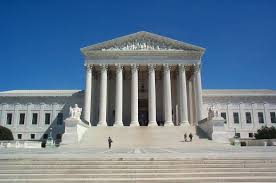In a suit against the Secretary of the Florida Department
of Corrections, Louie L. Wainwright, Gideon appealed to the Supreme Court. Gideon wrote a petition for a writ of certiorari from
prison. Gideon’s argument was that his
Sixth Amendment rights had been violated by not being granted counsel.

Wainwright’s argument in defense of the decision was
that the court was following the law of the State of Florida, which stated that
the court could only appoint counsel in cases of those accused of capital offenses.
The Supreme Court Justices gathered in a conference and discussed the case. Several attorneys sent in amicus curaie briefs in support of Gideon. The Supreme Court overturned the previous case,
Betts v. Brady, which allowed for selective use of the Sixth Amendment. Betts v. Brady had decided that the right to
counsel from the states was previously only applicable in federal cases. This time the opinion of the court was that
the right to counsel was essential to a fair and just trial. Therefore, no person convicted of a crime, regardless of wealth, race, or class, should be forced to trial without
counsel. One of the judge’s concurrent opinions
stated that the Constitution did not mention capital or non-capital cases in regard
to right to counsel, so all cases should receive counsel.

This is a landmark case because it eliminated one of the major sources of unfair trials in the United State's court system and provided individuals, who could not defend themselves otherwise, the materials with which to construct a proper defense. Gideon was retried with W. Fred Turner as his lawyer, who gave a convincing oral argument, and was acquitted this time rather than being sentenced to five years in jail.
No comments:
Post a Comment